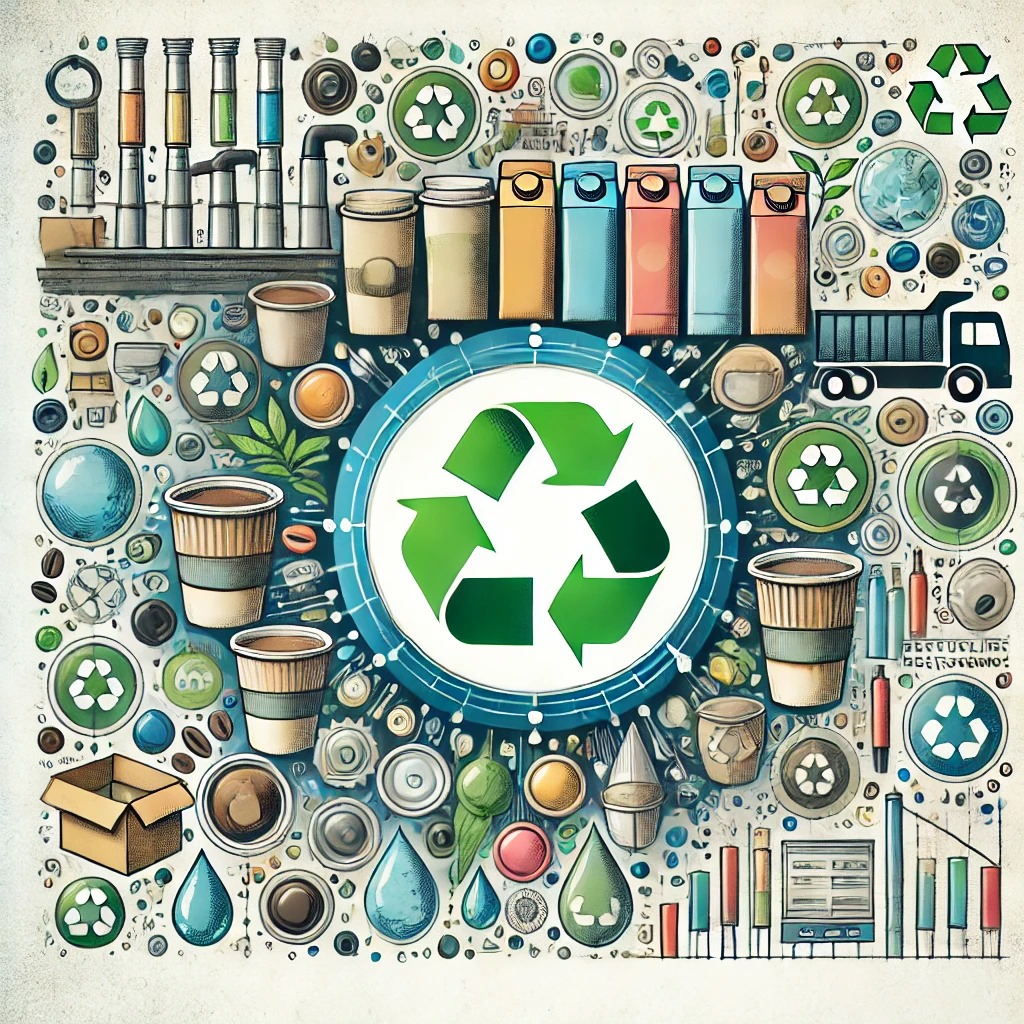Sustainable Solutions for Keurig: Embracing Circularity in Fast-Moving Consumer Goods

Fast-moving consumer goods (FMCGs) like Keurig coffee pods have revolutionized convenience but often come at a significant environmental cost. As a leader in coffee production, Keurig has a unique opportunity to champion sustainability by adopting innovative practices that reduce environmental footprints, enhance brand reputation, and deliver long-term value to stakeholders. Below is a detailed proposal for transforming Keurig’s approach to sustainability and circularity.
Key Areas for Improvement
1. Pod Design and Material Innovation
Keurig’s single-use pods contribute significantly to plastic waste. Transitioning to recyclable or compostable materials can drastically reduce waste generation while promoting circularity. Exploring alternative materials and design principles will ensure high-quality products with a reduced environmental impact.
2. Extended Producer Responsibility (EPR)
Implement an EPR program to take responsibility for the lifecycle of coffee pods. This could include:
- Buy-back Initiatives: Incentivize customers to return used pods for recycling.
- Recycling Partnerships: Collaborate with recycling facilities to streamline the collection and processing of pods.
3. Supply Chain Transparency and Sustainability
Keurig must prioritize ethical and sustainable sourcing of coffee beans. Partnering with Fair Trade-certified and Rainforest Alliance-accredited farmers will ensure social and environmental balance across the supply chain.
4. Energy and Resource Efficiency
Optimizing manufacturing processes can reduce waste and resource consumption. Key steps include:
- Using energy-efficient machinery to minimize fuel and raw material usage.
- Reducing water consumption through advanced brewing and cleaning systems.
- Implementing waste reduction practices to maximize resource utilization.
Implementation Plan
1. Research and Development
Establish a dedicated division to focus on:
- Redesigning coffee pods with sustainable materials.
- Exploring circular production models to minimize resource inputs and outputs.
2. Pilot Programs
Test new designs and recycling programs in select regions to gauge consumer feedback and operational feasibility. Use insights to refine and scale up initiatives.
3. Stakeholder Engagement and Collaboration
Foster partnerships across the value chain by engaging:
- Consumers: Educate on sustainable practices, such as recycling or using reusable pods.
- Suppliers: Encourage sustainable farming and ethical sourcing.
- Retailers: Collaborate on waste reduction and recycling initiatives.
4. Measurement and Reporting
Set measurable goals and key performance indicators (KPIs) to track progress, including:
- Waste reduction percentages.
- Recycling rates of pods.
- Carbon footprint and energy savings.
Regularly publish sustainability reports to maintain transparency and accountability.
Benefits of Implementing Sustainable Practices
- Waste Reduction and Resource Conservation
Transitioning to reusable or compostable pods and promoting recycling programs will minimize landfill waste and conserve natural resources. - Enhanced Brand Reputation
By adopting circularity, Keurig can position itself as an industry leader in sustainability, attracting environmentally conscious consumers and building brand loyalty. - Cost Savings and Operational Efficiency
Energy-efficient systems and optimized manufacturing processes can reduce operational costs and improve resource utilization. - Support for Ethical Practices
Sourcing coffee from Fair Trade and Rainforest Alliance-certified farms strengthens Keurig’s commitment to social and environmental responsibility.
Circular Initiatives for Workplace Keurig Users
For companies using Keurig pods in their offices, embracing circular practices can further enhance sustainability efforts:
- Reusable Pods: Encourage employees to switch from disposable pods to reusable options.
- Recycling Programs: Install designated bins for used pods and partner with local recycling facilities for collection.
- Composting Initiatives: If using compostable pods, provide compost bins and educate employees on proper disposal practices.
- Sustainable Coffee Choices: Choose ethically sourced coffee pods to support responsible farming practices.
- Energy-Efficient Practices: Use energy-efficient coffee makers and limit water waste during brewing.
Measuring Progress
Track the success of sustainability initiatives by monitoring:
- Recycling and waste diversion rates.
- Reduction in single-use pod consumption.
- Energy savings and carbon footprint reductions.
Share progress with employees and stakeholders to foster a culture of sustainability and inspire ongoing efforts.
Conclusion
By adopting these strategies, Keurig can lead the way in integrating circularity into FMCGs. Beyond addressing environmental concerns, these initiatives will deliver long-term value by enhancing operational efficiency, reducing costs, and building consumer trust. Companies using Keurig products in their workplaces can also play a pivotal role by implementing sustainable practices, creating a ripple effect of positive change.
Keurig has the opportunity to redefine industry standards and set a precedent for sustainable FMCGs. Let’s brew a better future—one pod at a time.
